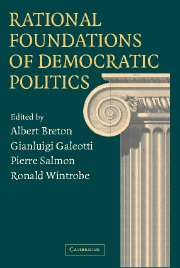Book contents
- Frontmatter
- Contents
- List of Contributors
- 1 Introduction
- PART ONE SOME PROBLEMS WITH DEMOCRATIC INSTITUTIONS AND TRENDS IN THEIR EVOLUTION
- PART TWO MORALS IN POLITICS
- PART THREE SOCIAL CAPITAL
- PART FOUR THE ROLE OF CONSTITUTIONS
- 10 Voting Rules: A Constitutional Quandary
- 11 Citizens' Sovereignty, Constitutional Commitments, and Renegotiation: Original versus Continuing Agreement
- 12 Constitutional Rules and Competitive Politics: Their Effects on Secessionism
- Index
- References
10 - Voting Rules: A Constitutional Quandary
Published online by Cambridge University Press: 28 July 2009
- Frontmatter
- Contents
- List of Contributors
- 1 Introduction
- PART ONE SOME PROBLEMS WITH DEMOCRATIC INSTITUTIONS AND TRENDS IN THEIR EVOLUTION
- PART TWO MORALS IN POLITICS
- PART THREE SOCIAL CAPITAL
- PART FOUR THE ROLE OF CONSTITUTIONS
- 10 Voting Rules: A Constitutional Quandary
- 11 Citizens' Sovereignty, Constitutional Commitments, and Renegotiation: Original versus Continuing Agreement
- 12 Constitutional Rules and Competitive Politics: Their Effects on Secessionism
- Index
- References
Summary
INTRODUCTION: STABILITY AND CHANGE OF ELECTORAL SYSTEMS
Civic and economic freedoms depend on the competitiveness of a political system, a competitiveness fostered by the constitutional division of powers, the rule of law, and the contestability of the elective positions. Regarding the last issue, this chapter deals with the citizens or representative relationship and moves from the factual remark that the rules governing the appointment of the members of legislative assemblies are not sanctioned in any contemporary constitution. Leaving the framing of people's consent to statutory laws amounts to entrusting the regulation of political competition to the very ones who should be regulated. Notwithstanding the whims of partisan politics, however, those rules prove to be remarkably stable. Hence a first question, why so much stability? If we agree with Roger Myerson (1999) that political leaders meeting and negotiating in the halls of government cannot be exempt from Adam Smith's remark on the risk of conspiracies against the public, we face a subtler question: Is any trick behind that stability, often accompanied by apparently minor innovations consented to by incumbent representatives?
As often occurs, it is the subtler question to have attracted scholars' attention when discussing political opportunism. The first question, however, remains unasked and political economists resort to assuming, explicitly or implicitly, the constitutional status of electoral rules (see, e.g., Buchanan and Tullock, 1962; Mueller, 1996). A weak assumption indeed in a relationship where it is the agent more than the principal who has the whip-hand.
- Type
- Chapter
- Information
- Rational Foundations of Democratic Politics , pp. 177 - 197Publisher: Cambridge University PressPrint publication year: 2003
References
- 2
- Cited by



